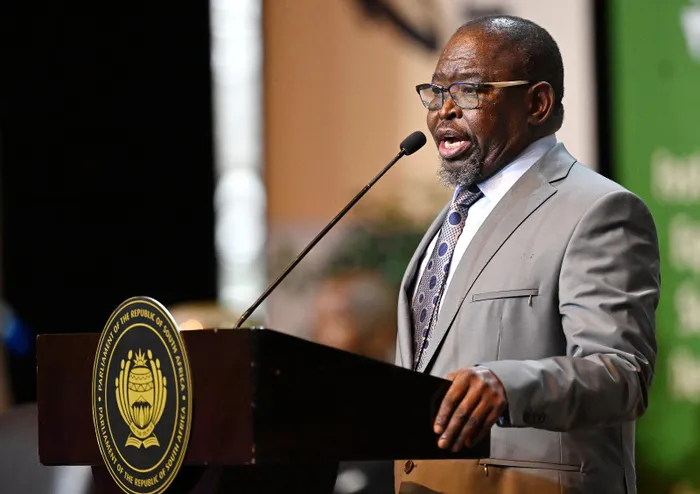
Finance Minister Enoch Godongwana delivered his Medium-Term Budget Policy Statement (MTBPS) on Wednesday.
Image: Phando Jikelo/ Parliament of SA
The National Treasury has expressed confidence that the government was on course to improve public health finances, lower the national debt burden, while improving efficiency and effectiveness of spending even in a low-growth environment.
Finance Minister Enoch Godongwana on Wednesday said the government remains on course to meet the fiscal targets set out in the February Budget.
Godongwana said Treasury's fiscal strategy aims to anchor fiscal policy by stabilising debt and growing the primary budget surplus; mobilise and direct more resources towards infrastructure investments; and improving efficiency and effectiveness of spending.
"I am pleased to inform the house and the country that we are on track to restore fiscal sustainability. Government debt will stabilise in 2025/26, at 77.9% of GDP. This is the first time since the 2008 financial crisis that public debt will not grow as a percentage of GDP," Godongwana said."
Since 2008, spending has consistently exceeded revenue, driving up debt and debt-service costs. These costs crowded-out spending on critical services and exerted pressure on lending rates across the economy.
But we are now turning this around. This year, revenues will exceed the budget estimates by R19.3 billion.
Meanwhile, debt-service costs will be lower by R4.8bn."This announcement is expected to resonate with credit ratings agencies, which have been calling for much more fiscal prudency and effective debt management.
After more than a decade of primary budget deficits, the government began running a primary budget surplus in 2023/24. the surplus, where revenue exceeds non-interest expenditure, is expected to improve from 0.5% of GDP in 2023/24 to 2.5% in 2028/29.the growing surplus enables the government to stabilize and then reduce debt and debt-service costs.
Over the Medium-Term Expenditure Framework, Godongwana said debt-service costs will grow by 3.8% annually, a significant reduction from the 7.4% growth anticipated at the time of the 2025 Budget.
"We will also achieve a primary budget surplus of R68.5bn – or 0.9% of GDP – this year. This will grow to R224bn by 2028/29. The overall budget deficit will narrow from 4.5% of GDP in 2025/26 to 2.7% in 2028/29," he said.
"To further ensure long-term sustainability of public finances, the government is considering options for a formal fiscal anchor. We are exploring a principles-led approach that provides for clear parliamentary oversight, stronger reporting on fiscal risks, and transparency on distributional impacts. Earlier this year, we published a discussion paper on this topic, and consultations with stakeholders and experts are ongoing."